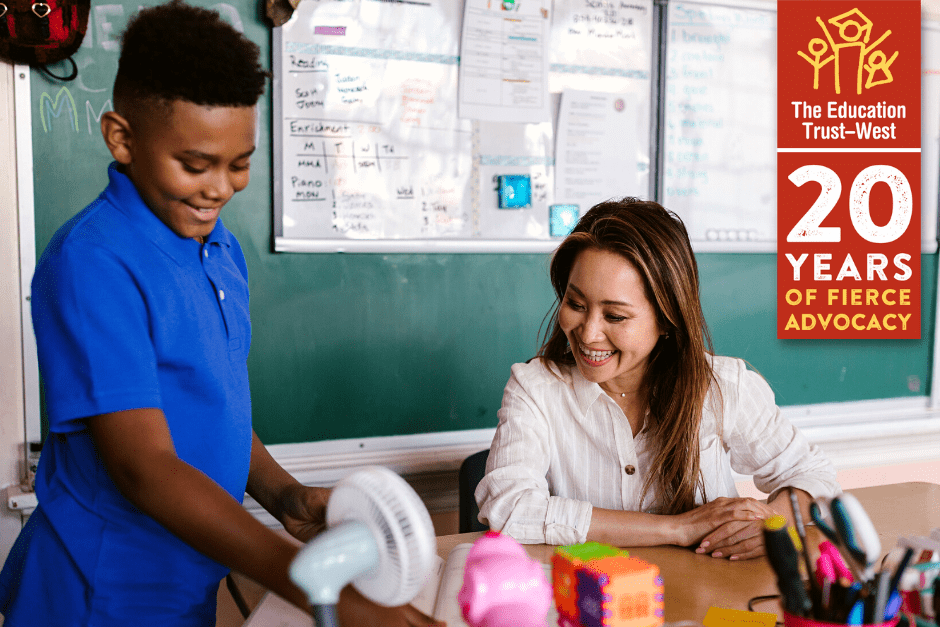The EdTrust–West (ETW) is celebrating 20 years of fierce advocacy toward education justice, and our Educational Equity Audits (EEAs) are one of our most lasting and enduring bodies of work.
Since 2007, ETW has been conducting Educational Equity Audits and Blueprints for Equity Action Planning. This two-phase research and facilitation process helps districts identify the systemic barriers that limit student success and has consequently, supported districts to move the needle in concrete ways toward equity. This initiative was started by ETW’s founding Executive Director, Russlynn Ali, who noticed the transformative work that Dr. Linda Murray, then Superintendent at San Jose Unified School District, was leading. At San Jose Unified, students were meeting A-G requirements and graduating from high school at higher rates than the state average and as a result, were better equipped for college and career opportunities. Ali and Dr. Murray shared a vision of expanding these practices across the state by creating a framework that other districts could follow.
The Educator Engagement team at EdTrust–West (formerly known as the Practice Team) perpetuates that vision through continued work on Educational Equity Audits. We have been on a continuous journey toward improvement and growth while supporting California schools and districts to do the same. Each member of our team joined EdTrust–West with a desire to continue the legacy of supporting districts to assess and eliminate barriers to education.

When we set this vision for our work, one thing was clear: it was critical to sharpen our focus on school culture and climate specific to the needs of Black, Latinx, and Native students, as well as students learning English and students facing economic disadvantages. With our vision in mind, we set two goals for our educator engagement work: (1) to support California schools, districts, and counties to identify and close equity gaps; and (2) to ensure our policy advocacy is informed by the needs of educators, students and their families.
In the last few years, the COVID-19 pandemic has illuminated and exacerbated existing inequities and has disproportionately affected California’s racially minoritized students. As we continue to build community with school and district leaders from across the state, we know the importance of looking back to move forward. In the last 15 years, our 20 Educational Equity Audits across California and Hawaii have demonstrated the importance of having concrete qualitative and quantitative data. These data have supported leaders in making informed decisions that best suit students’ academic and cultural needs. We took a retrospective look at our EEAs, and have uplifted five findings that appear the most in the audits across districts and across the years. We’re sharing those findings along with five resulting actions that helped districts address barriers to equity:
1. Graduation requirements did not align with A-G requirements.
If students want to apply to attend California’s public universities (the University of California and the California State University systems), they must complete a sequence of 15 A-G courses that are approved by the University of California Office of the President (UCOP), and receive a letter grade of “C-” or above. In many California school districts, racially minoritized students and students facing economic disadvantages are graduating from high school without completing this course sequence. This was true for 88% of districts that partnered with ETW for an EEA.
Key Action: After their audits, Pajaro Valley Unified School District and Carlsbad Unified changed their graduation requirements and made A-G the default curriculum as part of their commitment to preparing all students for college and career.
2. Many students who completed the A-G sequence were still ineligible to apply for UC/CSU because of “D” grades.
To fulfill the A-G requirements and be eligible to apply to UC or CSU, students must receive a “C-” or above in each course. Although a “D” is widely considered a passing grade at the high school level, it does not qualify for consideration by UC or CSU admissions. 75% of districts that participated in an Educational Equity Audit served students who weren’t UC or CSU eligible because of one or more “D” grades.
Key Action: After the audits, many districts examined their teachers’ grading policies across schools to ensure greater fairness, equity, and consistency. They considered practices such as instituting standards-based grading, offering students opportunities to retake tests, and eliminating the use of the “zero” in their grading.
3. There was a lack of timely interventions for students who struggle academically.
Students thrive when they have a community of support surrounding them, and faculty and staff who care about students’ wellbeing are critical to their success. Equally important is monitoring students’ progress while engaging in meaningful conversations with other school leaders about how to align resources and support to best meet students’ needs. Of the districts that participated in an EEA, 69% did not have timely interventions in place for students who were struggling academically.
Key Action: After their audits, counselors at Carlsbad and Santa Ana Unified School Districts met with students whose progress reports showed they were struggling academically to develop strategies for improving academic skills and performance.
4. There are significant gaps in access and success in A-G courses across ethnicity, especially for English learners, students with disabilities, and economically disadvantaged students.
Research indicates that discrepancies in course completion result from inequitable access to college preparatory coursework. For students who are enrolled in these courses, there are insufficient supports for racially minoritized students, students from communities with lower incomes, and students learning English. In 56% of the districts that partnered with ETW for an EEA, there were significant gaps in access and success of A-G courses among racially minoritized students. In 63% of the districts, there were significant gaps in access and success of A-G courses among English learners, students with disabilities, and economically disadvantaged students.
Key Action: In Santa Ana Unified, counselors helped students develop four-year academic plans and select courses, monitored grades, and conferred with parents and students about concerns.
5. California high schools inconsistently offer A-G approved Career Technical Education (CTE) classes.
Each year, California high schools must submit a course list to the University of California Office of the President (UCOP) for A-G approval to ensure course offerings align with UC and CSU requirements for admission. The inconsistency of inclusion and approval of CTE courses on these lists creates disparities in opportunities to complete A-G course requirements. Even if a student does not plan to attend a four-year college after high school, completing the A-G sequence provides the rigorous and varied high school experience needed to prepare students for professional pathways. Of the districts that participated in an EEA, 56% did not provide students with equitable access to A-G approved CTE courses.
Key Action: After their audit, Pajaro Valley Unified School District expanded the number of CTE courses that are A-G approved.
It’s been 15 years since ETW conducted its first Educational Equity Audit, and some of the themes that the early audits uncovered remain present in schools and districts across the state today. In each of the 20 EEAs EdTrust–West has conducted, we have observed great value in districts having an external partner with whom to engage in difficult but necessary conversations. We support districts in creating actionable plans that transform students’ school experiences into humanizing and equitable ones. As former educators and school leaders, we recognize the demanding nature of this work. We also know that educational justice is a collective effort that requires a community of support, accountability, and encouragement. Through intentional partnerships and unrelenting commitment, educators can collaborate with all stakeholders to create school communities that honor student needs.
If you are an educator, district leader, or education equity advocate and want to learn more about how to support this work, we invite you to:
- Join us on Thursday, March 24th at 3:30 PM PST for a webinar highlighting more about the Education Equity Audit process, and opportunities for future partnership with our team.
- Visit our Educator Engagement page to learn more about our offerings
Editor’s Note: We would like to thank Christa Koppuzha, our School District Engagement Fellow of the 2020 Russlynn Ali Summer Fellow cohort, who conducted the research that informed this blog.


